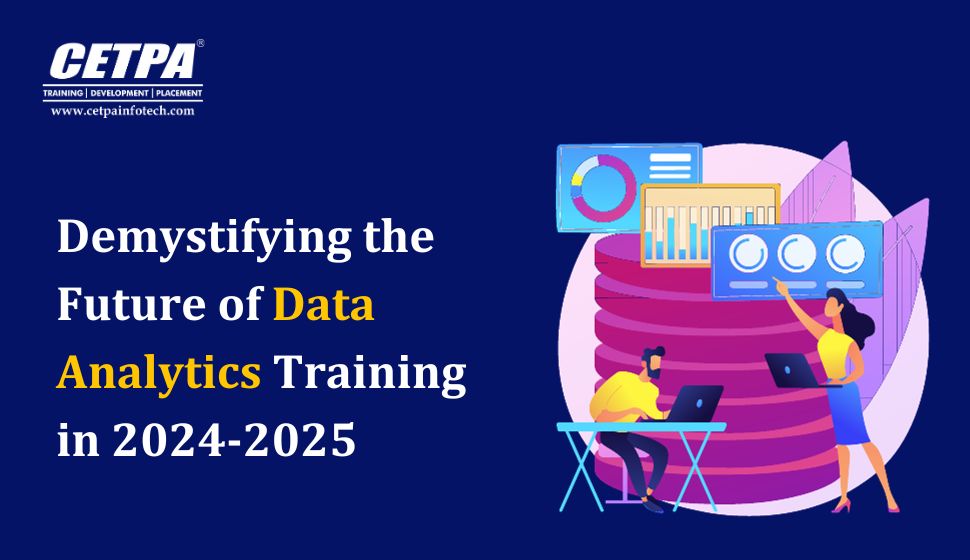Demystifying the Future of Data Analytics Training in 2024-2025

AI-Powered Learning: The Revolution in Data Analytics Training
In the transforming world of data analytics training, AI is set to restructure the way professionals gain and hone skills. In 2024-2025, a rise in AI-powered learning platforms is expected that personalize learning based on learning styles, pace, and preferences. These platforms will use machine learning algorithms for analyzing user behavior, adapting content delivery, and providing real-time feedback. This further assists in the creation of a extensively customized and effective learning experience.
Additionally, virtual assistants and chatbots, driven by natural language processing, are poised to become vital parts of data analytics courses. Students who opt to pursue our reputed Data Analytics Training in Noida can refer to these AI entities to clarify concepts, acquire instant support, and even practice real-world situations via simulated ecosystems. Nonetheless, the combination of AI with data analytics training will improve efficiency and make learning a more interactive experience.
So, join us on this informative journey as we explore the future of pursuing Data Analytics Training in 2024 – 2025!
Immersive Technologies: Bridging The Gap Between Theory and Practice
As 2024 ushers, immersive technologies like VR and AR are set to play a major role in data analytics training. These technologies will offer students hands-on, real-world experiences within virtual ecosystems. It will further allow learners to apply their theoretical knowledge to practical situations. Using a VR headset, students studying data analytics can virtually enter a corporate data center and do tasks like dataset analysis, problem-solving,etc. much like they would in a real-world scenario. AR, on the contrary, could attach data graphics to tangible items, building interactive learning environments.
By embracing immersive technologies, data analytics training will not only become more interacting but will also reduce the gap between classroom learning and on-the-job applications. This pattern is indicative of a larger movement in the industry toward hands-on and experiential learning.

Exploring The Top Technologies That Reduce The Gap Between Theory and Practice –
Some of the immersive technologies introduced in our Data Analytics online training and offline training that will reduce the gap between theory and practice are:
- Virtual Reality Simulations: This involves the usage of VR simulations for replicating real-world situations relevant to data analytics. It allows students to delve in virtual ecosystems, like data centers or business settings, to apply theoretical knowledge in practicality. Also, it improves the problem solving skills but putting forth challenges and activities within the simulated environment.
- Augmented Reality Data Visualizations: It focuses on the overlapping of data visualizations onto physical objects via AR, building an interactive learning environment. Not only that, but it allows students to navigate and analyze data in real-time by communicating with augmented visualizations. This helps in reducing the gap between abstract data concepts and tangible, real-world applications via AR overlays.
- Interactive Case Studies in Virtual Ecosystems: This specific technology involves creating virtual case studies that challenge learners to analyze complex data sets, make decisions, and observe the consequences within the simulated landscapes. This helps in building a dynamic learning experience where learners can see the instant impact of their analytical choices.
- Collaborative Learning in Virtual Spaces: This technology facilitates collaborative projects and group work via virtual spaces. It allows students to work collaboratively irrespective of their geographical locations.
- Industry-Relevant Simulations: The main focus of this technology is development of VR and AR simulations that mirror the issues and dynamics of the present data analytics industry. It ensures that learners are exposed to situations and problems that meet the latest trends and demands.
- Adaptive Learning Paths in VR: It concentrates on incorporating adaptive learning algorithms in VR ecosystems. The primary aim is to curate the difficulty and content of simulates on the basis of individual student proficiency.
Ethics and Governance: Navigating the Data Analytics Training Ecosystem Responsibly
In the rapidly evolving world of data analytics, ethical considerations and governance are acquiring popularity. As we step into 2024-2025, data analytics training will concentrate on ethical practices, responsible data usage, and compliance with regulations. The courses will dive into the ethical implications of data collection, analysis, and decision-making. This will thereby prepare professionals to explore the complex ethical ecosystem of the data-driven age. Additionally, training modules on data governance will emerge as a standard. This will educate students about management, securing, and ensuring the integrity of data throughout its lifecycle.
Read Also: The Surprising Link Between a Company’s Growth and Its Data Analytics Strategy
Further, in the constantly advancing world of data analytics, a paradigm shift is underway. This emphasizes the importance of practitioners to understand and address the societal effects of their work. Understanding the ethical concerns linked with data analytics, these courses aim to include a profound sense of responsibility in individuals. This change is a sign that the industry is increasingly recognising the need for experts who can deal with the ethical intricacies of data analysis. Hence, it ensures that technological improvements align with societal values and ethical standards.
Conclusion:
In conclusion, the potential future of data analytics training in 2024-2025 promises the confluence of cutting-edge technologies, tailored learning experiences, and a greater emphasis on ethical considerations. The landscape of data analytics education is developing to meet the demands of a quickly changing industry as AI transforms the learning process, immersive technologies give hands-on experiences, and ethical considerations take center stage. Adopting these advances will enable the next generation of data professionals to succeed in an era characterized by data-driven decision-making and technical developments.



